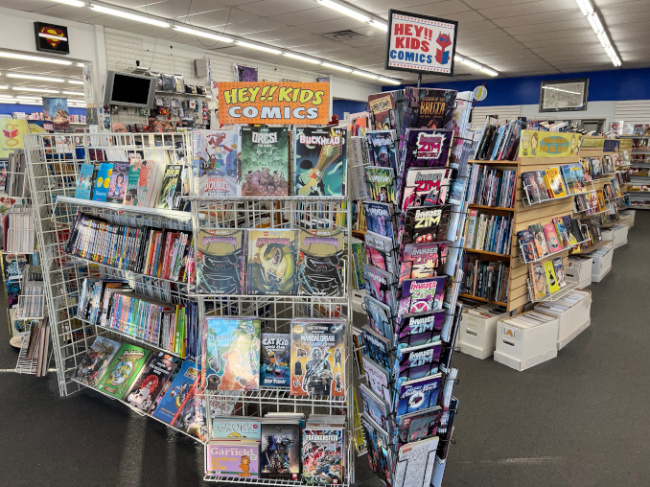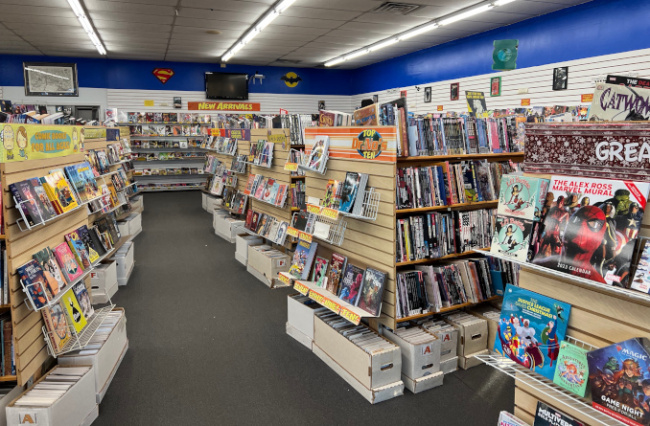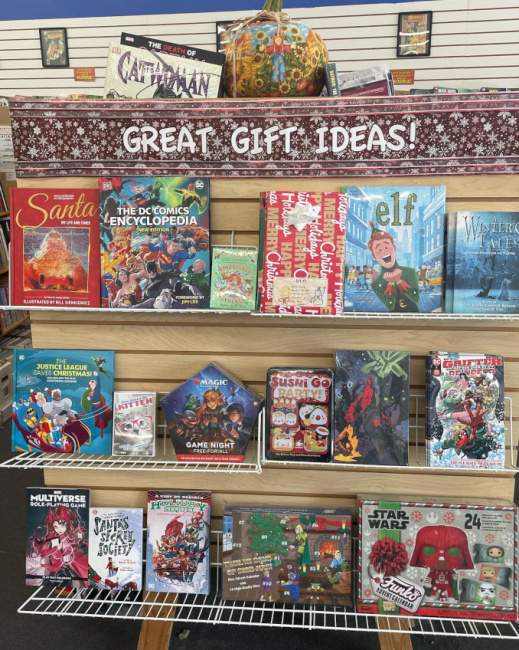In Business 3×3, a business retailer or executive will share their experience with three things they’ve done right, three things they’ve done wrong, and what else they’ve learned along the way.
A comic store nearly killed Cliff Biggers. Or maybe it was the high school students; who can tell?
Biggers was a high school English teacher and avid comic reader in the 1970s. In 1978, the owner of the store Biggers frequented, noting his familiarity with the industry, asked Biggers if he’d do the ordering for the store. The pair stuck a deal, and Biggers started running the orders. Then in 1982, Biggers got a fateful phone call from the owner.
“Out of the blue, he called me and said, ‘I have just realized that I hate people, and I don’t want to ever deal with the public again. So I’m going to close the store, or I can sell it to you,'” Biggers recalls. Biggers jumped at the chance to buy the store. He kept teaching English, and also helped launch the Comic Shop News publication in 1987. Then fate called again in 2001.
“I was doing all of those, and… had a major heart attack and heart surgery,” Biggers says. “My cardiologist said, ‘That was your body’s one and only warning shot. It took us almost seven minutes to get you back, we were just about ready to give up. Next time, I’ll be giving your wife autopsy results. You need to give up something.'”
On the advice of his doctor, Biggers ditched the teaching gig.
“My cardiologist was also one of my oldest comic customers,” Biggers notes. “If I died, his pull list was not written down anywhere. He had a vested interest.”
And so, Dr. No’s Comics and Games Superstore in Marietta, Georgia is still alive and well today with Biggers at the helm. And in his journey, he’s learned a lot.
THE GOOD
HIRE THE ‘OTHER’ PEOPLE
Everyone knows hiring is important. Biggers’ finer point is to make sure to hire people who are unlike him.
“I didn’t want to hire people who just duplicate my knowledge,” he says. “If you just hire people who know what the owner knows, you don’t diversify your store at all.”
And so Biggers has sought out the “other,” to outstanding results.
“I have brought in staff members with fields of expertise that can complement mine, but always add to it as well,” he says. “That’s vital because there are lots of things the store carries that do well that are not a personal interest of mine. I never would have carried certain items were it not for hiring the right people to broaden off of what I know.”
And Biggers is very happy with his hiring decisions.
“The staff is rock-solid,” he says. “If anything, the secret to my store’s success is the staff, and their ability to do what I can’t do.”
LISTEN TO YOUR ‘OTHER’ PEOPLE
Once you make the hire, you have to start listening to the people you hire.
“The staff has made suggestions for changes that I never would have come up with,” Biggers says. “I’ll try their changes, and several of them have worked very well.” Manga is a good example at Dr. No’s.
“We had tried manga back in the late ’90s-early 2000s,” Biggers says. “It did very poorly for us. There was a Barnes & Noble and a Borders nearby, and customers at that time had been trained to use those stores like libraries and read the manga in the store. We couldn’t crack that market.”
Biggers tried manga again at the behest of a staffer.
“A couple years ago, my comics manager said, ‘I think we can make manga successful now. It’s a different market than it was then,'” Biggers recalls. “She put together a plan where we’d stock the first and most recent volumes on certain series, first volume only on other series, and everything we could get on another set of titles. Her plan looked reasonable, I ran the numbers, and the worst that could happen was a manageable loss. So we tried it and it’s turned out to be very popular. She’s grown that market for us very successfully, and I never would have gone back to it without her.”
GO A MILE WIDE AND AN INCH DEEP
Biggers carries with him some old-school advice from Russ Ernst, who used to run Glenwood Distribution back in the day.
“Russ said, ‘The best comic shops have an inventory that’s a mile wide and an inch deep,'” Biggers says. “He always said don’t go super-deep on anything, but carry as much as you can so as many people as possible can find just what they’re looking for when they walk in your store.”
And so Dr. No’s carries a very broad selection, which has worked out great for the store.
“That advice has allowed us to become the oldest surviving comic shop in metro Atlanta, with the best stock in the Southeast, and we’ve always remined profitable,” Biggers says.
THE BAD
BEWARE EXPANSION
Maybe a mile wide can get too wide. Biggers found out the hard way, and not just once.
“Not once, but twice, I have tried to expand into a full line of fantasy, science fiction, horror, and even mystery books,” he says. “It did not work.”
Biggers tried and abandoned the bookstore motif, but tried again five years after the first foray when Borders closed.
“But we still could not hit that critical mass,” he says. “We had the books, but we could not find that critical mass of readers. As much as I love fantasy, science fiction, horror, and mystery, we have found that a small, carefully curated selection is all we can sell. I cannot be a full-on book shop.”
BEWARE THE COMPANY STORE
Dr. No’s expanded into games, but has found difficulty with one supplier.
“Games Workshop,” Biggers says. “Worst disaster. To be honest, I had not considered the Machiavellian treachery of Games Workshop, who used their chosen stores to help them decide where to put their own company stores, which is exactly what they did.”
Biggers says Games Workshop put in a company store eight miles from his front door, but did not supply Dr. No’s with its best merchandise for three to six months after release. He ditched them. Until they came knocking again.
“Like Lucy and the football, I decided to try them again,” Biggers says. “But the second time, I was very wise. I convinced them to place merchandise with me on 90-day consignment, and within 90 days, they pulled the same trick. I said, ‘Thanks, we will give you your merchandise back, and I will not carry you under these terms.’”
BEWARE THE BIG BOX
Comics are a great specialty item, and hobby games as well. After that, competition gets tough…
“When you have Walmart and Target within a couple of miles of you in either direction, I simply cannot compete on the mass-market toy side,” Biggers says. “When my wholesale price is higher than the retail price at my competitors, I cannot win that battle.”
And so Biggers doesn’t carry mass-market toys. Which is not to say he doesn’t carry toys at all.
“We loved DC Direct when they were around, because they weren’t in the mass market,” he says. “We thrived on their toys. We still do very well with Diamond Select figures and statues because it’s a marketplace where I don’t have to compete with Target down the street.”
AND WHAT ELSE?
“I knew I was having a heart attack. The paramedics called to my house said, ‘We don’t think it’s anything, we think it’s just indigestion.’ My wife said at that point, I fell over backwards, and the paramedics said, ‘Looks like he’ll do anything to prove he’s right.'”
“Next thing I know, they’re reviving me at a hospital. They said they were just about to give up because they were approaching the part where brain damage sets in. So I consider myself very lucky.”
“The doctor said it was just physical stress. He said you don’t feel it because it’s not mental or emotional stress, but you’re working about a 90-hour week between the newsletter, teaching, and the store, and the body is not designed to do that.”
“My general manager, who’s also my games manager, has found similar success [to manga] with collectible card games and board games. He said, ‘We have to expand into these. We have a selection, but it doesn’t reach critical mass. People come in and see we’re not a full-service game shop, so they go elsewhere.’ Again, he came up with a plan, it looked convincing, we tried it, and games have been a significant part of our store ever since.”
“One of the failings of so many people trying to get into comic retailing is understanding the math side. So many people try to start stores underfunded.”
“Every prospective retailer needs a good retail math lesson to understand the devastation that deep discounting does to their bottom line. I’ve seen stores that couldn’t figure out how they failed, and we’d sit down and do a postmortem, and find out in every case, they were discounting so deeply that if they lost even one in four sales on any product, it negated the profit of that whole product.”
“I understand the desire to try to undercut on price, but… you can put yourself out of business. Retail math is a crucial skill. Everyone should find a mentor, in comics or somewhere else, who can show them the benefits of realistic pricing and realistic ordering.”
Click Gallery below for store pics!
Source: ICv2





